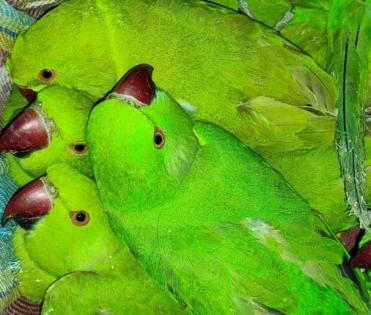PETA, Lucknow police rescue rose-ringed parakeets
By IANS | Updated: December 13, 2021 11:00 IST2021-12-13T10:48:27+5:302021-12-13T11:00:17+5:30
Lucknow, Dec 13 The People for the Ethical Treatment of Animals (PETA) India, Lucknow police and the forest ...

PETA, Lucknow police rescue rose-ringed parakeets
Lucknow, Dec 13 The People for the Ethical Treatment of Animals (PETA) India, Lucknow police and the forest department have rescued 11 rose-ringed parakeets from illegal traders in the Nakhas bird market.
Representatives of PETA India found the parakeets crammed into a small plastic bag in which they were suffocating and jostling for air and space.
The police registered an FIR under Sections 2, 9, 39, 49, 50, and 51 of the Wildlife (Protection) Act (WPA), 1972, and Section 11(1)(e) and 11(2) of The Prevention of Cruelty to Animals Act, 1960.
Parakeets are protected under Schedule IV of the WPA, and capturing, trading, or keeping them as "pets" is a punishable offence.
According to a PETA release, the birds are currently in the custody of the forest department and are expected to be released into their natural habitat after examination by a veterinarian and upon receiving the permission of the court.
Lucknow's Additional Deputy Commissioner of Police (ADCP), Chiranjeev Nath Sinha said" "The Prevention of Cruelty to Animals Act, 1960, makes it illegal to keep or confine any bird in any cage which does not offer a reasonable opportunity for movement, which for bird, would mean flight. Birds have a fundamental right to fly, and they belong in nature and in the sky flying free with their families, not in eternal lockdown."
Sinha is a well-known animal activist and also the brand ambassador of Lucknow Zoo.
PETA India Senior Advocacy Officer Harshil Maheshwari said: "Birds are born to fly in the open sky, not spend their life in a cage. PETA India applauds Chiranjeev Nath Sinha and his team for sparing these birds a lonely, neglected existence in a cage and for showing that illegal treatment of animals will not be tolerated."
He pointed out that the WPA, 1972, bans the capture, caging, and trading of various indigenous birds and that non-compliance can lead to imprisonment for up to three years, a fine of up to Rs 25,000, or both.
In addition, caging birds violates the PCA Act, 1960, which stipulates that it is illegal to keep or confine any animal in any cage or other receptacle which does not measure sufficiently in height, length, and breadth to permit the animal a reasonable opportunity for movement.
Disclaimer: This post has been auto-published from an agency feed without any modifications to the text and has not been reviewed by an editor
Open in app